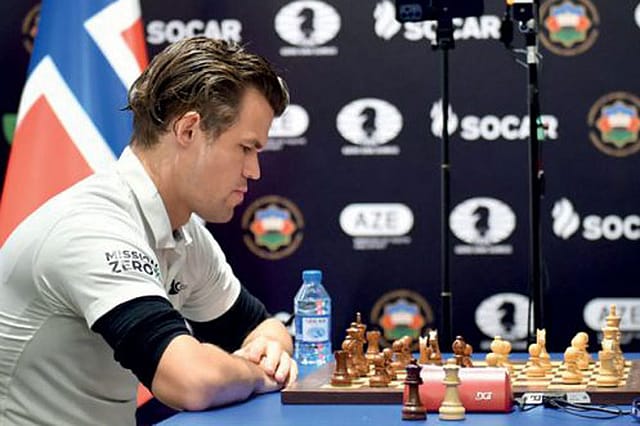Game Changer

The chess world is embroiled in a significant controversy surrounding the upcoming Freestyle Chess Grand Slam Tour, a new series co-founded by the game's reigning king Magnus Carlsen and German entrepreneur Jan Henric Buettner. This tour aims to revolutionise the game by promoting Chess960 or freestyle chess, a variant that randomises the starting positions of pieces to emphasise creativity and reduce reliance on memorised openings. However, the tour has encountered substantial opposition from the International Chess Federation (FIDE). The conflict began when the Freestyle Chess Grand Slam Tour branded its series as a "World Championship". FIDE, asserting its exclusive authority over world championship titles, objected to this designation and allegedly attempted to stop players from participating in the tour. Negotiations ensued, but the FIDE council ultimately did not approve an agreement, leading to heightened tensions between the two parties. Buettner and Carlsen have called for the resignation of FIDE President Arkady Dvorkovich. They have accused Dvorkovich of reneging on promises and of coercing players into signing waivers to remain eligible for official FIDE events.
Amidst the escalating dispute, Indian chess legend Viswanathan Anand withdrew from the inaugural event of the Freestyle Chess Grand Slam Tour, scheduled to commence in Germany on February 7, 2025. Anand's decision was likely influenced by his recent appointment as FIDE Vice President and the disagreements between FIDE and the tour organisers. Carlsen, known for his unyielding principles, withdrew from the World Rapid and Blitz Championships in New York in December last year over a dress code dispute, a move that may be interpreted as a broader critique of FIDE's rigidity. This act of defiance pointed to a deeper rift—a clash between tradition and innovation, between the custodians of the game's heritage and the harbingers of its evolution.
It's the Pits!
13 Feb 2026 - Vol 04 | Issue 58
The state of Indian cities
The Freestyle Chess Grand Slam is Carlsen's answer to FIDE. No more governing bodies, no more outdated codes of conduct wielded as weapons against the very players who make the game matter. The board will still be there, but everything else, including the opening theory that has ossified into scripture, will be remade. A variant conceived by the enigmatic grandmaster Bobby Fischer in 1996, chess960 is an endeavour, however flawed, to return the game to its roots, where intuition and ingenuity reign supreme.
For years, FIDE's stance on chess960—or Fischer Random—has been one of almost bureaucratic neglect. The variant has hovered at the periphery of elite chess, occasionally surfacing in exhibition matches but never earning the administrative scaffolding of its classical counterpart. In 2008, FIDE made a quiet concession to the game's restless undercurrents by granting chess960 an annex in the Laws of Chess. It was neither a full endorsement nor a rejection. Then, in 2019, FIDE sanctioned its first official World Fischer Random Chess Championship, a move that elevated chess960 from the periphery to a stage of consequence. It was here that Wesley So, a player known for his pragmatic precision, beat Carlsen to become champion. American grandmaster Hikaru Nakamura took the crown in 2022. No subsequent World Fischer Random Chess Championship was held, however, reportedly because FIDE could not find any bidders to host the event in 2024. There has never been an official Chess960 rating list, an omission that signals FIDE's reluctance to institutionalise a format that fundamentally destabilises the established hierarchy of preparation-based mastery.
Considering that this year, with the Freestyle Chess Grand Slam Tour, there will be more games of chess960 played between elite players than ever before, the variant may finally drum up some excitement. One leg of the tour was supposed to be held in New Delhi, but recent reports suggest that the venue may change because of a lack of interest from investors. The Freestyle Chess G.O.A.T. Challenge, played in Weissenhaus, Germany, in 2024, was a precursor to the tour, with a pantheon of chess gods fighting for supremacy without the guardrails of pre-game preparation. The games were wild, tense, structurally alien—in a word, alive. Classical chess, with its deep theoretical trenches, often results in dry, symmetrical manoeuvring. Here, the initial asymmetry led to collisions of ideas that no opening book had ever foreseen. Some games were borderline incomprehensible at first glance—knights on the rim, kings scurrying to odd squares early, seemingly uncoordinated pawn thrusts. The event was a proof of concept, a showcase for the idea that chess—real chess—begins not in the opening preparation but in the moment two players sit down and have to think. What the Freestyle Chess G.O.A.T. Challenge ultimately did was shift the Overton window of what elite chess could look like. Now, the Freestyle Chess Grand Slam Tour is upon us, and India's D Gukesh, the newly minted classical world chess champion, is among those in the race. Will FIDE adapt, or will the revolution rewrite the rules without them?
